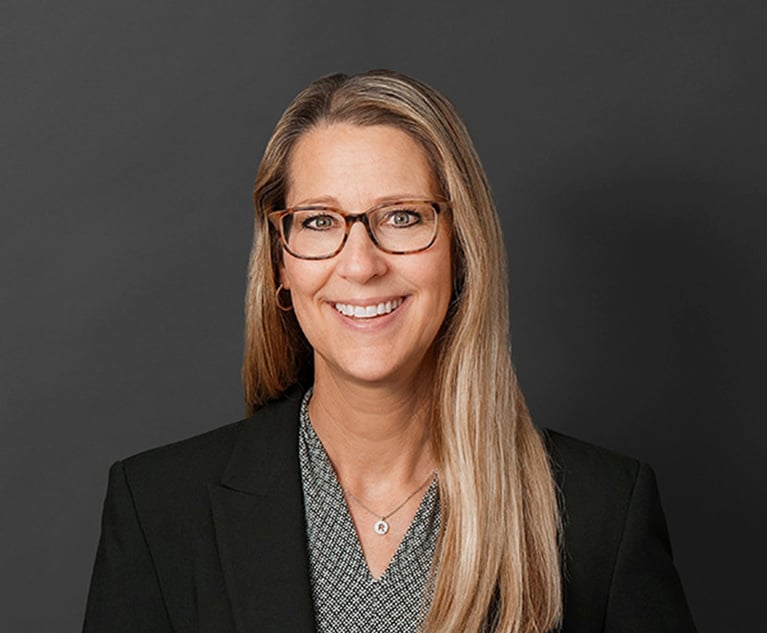Judge Denies $450K Fee Request for Handling of Pretzel Sandwich Dispute
While the lawyer representing a bakery sued for trademark infringement over a pretzel sandwich thought the lawsuit was half-baked, a federal judge ruled that it did not rise to the level of a fee sanction.
December 12, 2017 at 12:44 PM
3 minute read
 U.S. District Chief Judge Lawrence Stengel of the Eastern District of Pennsylvania
U.S. District Chief Judge Lawrence Stengel of the Eastern District of Pennsylvania
While the lawyer representing a bakery sued for trademark infringement over a pretzel sandwich thought the lawsuit was half-baked, a federal judge ruled that it did not rise to the level of a fee sanction.
U.S. District Chief Judge Lawrence F. Stengel of the Eastern District of Pennsylvania denied a motion for $450,000 in attorney fees from Barry L. Cohen of Royer Cooper Cohen Braunfeld in Conshohocken, who represents defendant Better Bakery.
According to Stengel's opinion, the case resolved in Better Bakery's favor, but an award for attorney fees to be paid by the plaintiff, Sweet Street Desserts, would be appropriate only if the litigation was extraordinarily vexatious and pointless.
“Here, Sweet Street's claims were well-reasoned, supported by case law, and based in the factual record of the case, which included written discovery, exhibits, and deposition testimony,” Stengel said. “There is nothing in the record that shows Sweet Street's attorney acted in an egregious nature that would warrant sanctions under Section 1927. Here, awarding attorney's fees would venture too closely to post hoc reasoning that simply because Sweet Street did not ultimately prevail, its action must have been unreasonable.”
Sweet Street sued Better Bakery, alleging that after a failed attempt at collaboration between the two companies to produce a new pretzel sandwich, Better Bakery went incommunicado and eventually started selling the pretzel sandwich on its own to large-scale retailers like Wal-Mart and Sam's Club.
Sweet Street claimed Better Bakery violated a nondisclosure agreement and an oral accord and argued it had protectable intellectual property in the case, according to Stengel. However, two counts of Sweet Street's complaint were tossed initially, and the rest of the case was later dismissed in its entirety.
Cohen did not immediately respond to a request for comment. Neither did Sweet Street's attorney, Joseph E. Wolfson of Stevens & Lee in Philadelphia.
Better Bakery argued that the case was exceptional in the way the plaintiffs litigated it and, therefore, warranted attorney fees. Stengel disagreed.
“This is not an exceptional case,” Stengel said. “There is no evidence in the record that Sweet Street acted in bad faith, fraud, or with malice. To the contrary, the record shows evidence that Sweet Street initiated this lawsuit in good faith. The parties had a collaborative and cooperative relationship centered on creating a new and exciting product that would benefit both parties.”
He continued, “Sweet Street believed, though incorrectly, that because of the [nondisclosure agreement] and the presumed oral exclusive contract that it had protectable intellectual property rights in the pretzel product that was being produced. Based on this good faith belief and Better Bakery's choice to market and sell its own similar pretzel sandwich, Sweet Street initiated this action.”
Stengel also denied the attorney fee request made under the Pennsylvania Uniform Trade Secrets Act, and a request that the court use its disciplinary powers to sanction Sweet Street's counsel.
This content has been archived. It is available through our partners, LexisNexis® and Bloomberg Law.
To view this content, please continue to their sites.
Not a Lexis Subscriber?
Subscribe Now
Not a Bloomberg Law Subscriber?
Subscribe Now
NOT FOR REPRINT
© 2025 ALM Global, LLC, All Rights Reserved. Request academic re-use from www.copyright.com. All other uses, submit a request to [email protected]. For more information visit Asset & Logo Licensing.
You Might Like
View All


Penn State Dickinson Law Dean Named President-Elect of Association of American Law Schools
Trending Stories
Who Got The Work
J. Brugh Lower of Gibbons has entered an appearance for industrial equipment supplier Devco Corporation in a pending trademark infringement lawsuit. The suit, accusing the defendant of selling knock-off Graco products, was filed Dec. 18 in New Jersey District Court by Rivkin Radler on behalf of Graco Inc. and Graco Minnesota. The case, assigned to U.S. District Judge Zahid N. Quraishi, is 3:24-cv-11294, Graco Inc. et al v. Devco Corporation.
Who Got The Work
Rebecca Maller-Stein and Kent A. Yalowitz of Arnold & Porter Kaye Scholer have entered their appearances for Hanaco Venture Capital and its executives, Lior Prosor and David Frankel, in a pending securities lawsuit. The action, filed on Dec. 24 in New York Southern District Court by Zell, Aron & Co. on behalf of Goldeneye Advisors, accuses the defendants of negligently and fraudulently managing the plaintiff's $1 million investment. The case, assigned to U.S. District Judge Vernon S. Broderick, is 1:24-cv-09918, Goldeneye Advisors, LLC v. Hanaco Venture Capital, Ltd. et al.
Who Got The Work
Attorneys from A&O Shearman has stepped in as defense counsel for Toronto-Dominion Bank and other defendants in a pending securities class action. The suit, filed Dec. 11 in New York Southern District Court by Bleichmar Fonti & Auld, accuses the defendants of concealing the bank's 'pervasive' deficiencies in regards to its compliance with the Bank Secrecy Act and the quality of its anti-money laundering controls. The case, assigned to U.S. District Judge Arun Subramanian, is 1:24-cv-09445, Gonzalez v. The Toronto-Dominion Bank et al.
Who Got The Work
Crown Castle International, a Pennsylvania company providing shared communications infrastructure, has turned to Luke D. Wolf of Gordon Rees Scully Mansukhani to fend off a pending breach-of-contract lawsuit. The court action, filed Nov. 25 in Michigan Eastern District Court by Hooper Hathaway PC on behalf of The Town Residences LLC, accuses Crown Castle of failing to transfer approximately $30,000 in utility payments from T-Mobile in breach of a roof-top lease and assignment agreement. The case, assigned to U.S. District Judge Susan K. Declercq, is 2:24-cv-13131, The Town Residences LLC v. T-Mobile US, Inc. et al.
Who Got The Work
Wilfred P. Coronato and Daniel M. Schwartz of McCarter & English have stepped in as defense counsel to Electrolux Home Products Inc. in a pending product liability lawsuit. The court action, filed Nov. 26 in New York Eastern District Court by Poulos Lopiccolo PC and Nagel Rice LLP on behalf of David Stern, alleges that the defendant's refrigerators’ drawers and shelving repeatedly break and fall apart within months after purchase. The case, assigned to U.S. District Judge Joan M. Azrack, is 2:24-cv-08204, Stern v. Electrolux Home Products, Inc.
Featured Firms
Law Offices of Gary Martin Hays & Associates, P.C.
(470) 294-1674
Law Offices of Mark E. Salomone
(857) 444-6468
Smith & Hassler
(713) 739-1250






